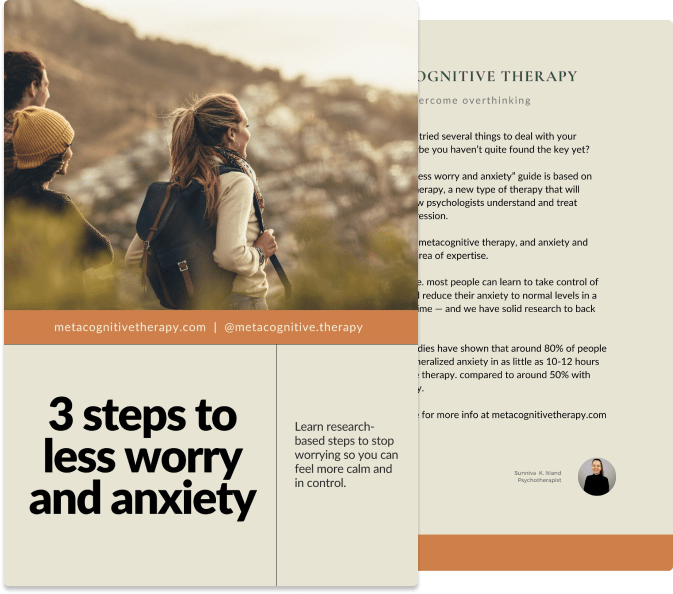What are trigger thoughts, and how do you stop ruminating on them?

Download our best tips on reducing anxiety and worrying
Learn three powerful metacognitive therapy steps to stop the worry cycle, reduce anxiety, and feel calmer in everyday life.
.jpeg)
.jpeg)
What if everything you've learned about negative thoughts is wrong? We've long been told that we should change or challenge our negative thoughts to “fix” our mental health and feel better.
But what if it's not the thoughts themselves that are the problem, but the way we respond to them? What if the struggle to get rid of negative thoughts only makes anxiety and overthinking worse?
This is the research-backed perspective we explore in Metacognitive Therapy — a new and highly effective approach that can help you reduce rumination and regain control of your mind.
What exactly are trigger thoughts?
Trigger thoughts are the first (often fleeting) thoughts that kick off an episode of rumination or worry. In cognitive therapy, they're called negative automatic thoughts.
These thoughts can be about everything from health, work, school, children, relationships, finances, anxiety, politics, climate, and accidents, or the future more generally.
We often treat the thoughts as important or true, or begin to analyze or worry about the thought without even realizing it.
The trigger thoughts feel important, and it can seem like you HAVE to do something about them. But when you start worrying, searching for answers, or fighting against the thoughts, it can lead to a prolonged negative spiral that ultimately triggers anxiety and rumination.
How a negative thought turns into anxiety and rumination
Let's look at a typical worry thought sequence:
- You get a negative automatic thought, like 'What if my husband gets into an accident on his way to work?'
- You start worrying and ruminating over the thought: 'That would be unbearable, how would I cope with that? What would happen to our house and kids?'
- You try to reason with yourself: 'Of course it won't happen. He drives carefully, and nothing has ever happened before.'
- But then comes a new automatic negative thought: 'But what if it does happen?’
- You try to reason with yourself again: 'Of course it won't happen. I need to stop worrying.’
- A new negative thought arises: ‘But how do you know it won't happen today?'
You try to distract yourself by scrolling on your phone, but it doesn't work completely, and the thoughts continue to plague you.
Once you've started worrying, the internal dialogue can continue for hours, even though you try to find solutions, stop thinking about it, or reason with yourself. In an attempt to regain control, you might not stop thinking about it until you've called your husband to make sure he's safe.
For people who have anxiety, this is a familiar thought pattern: The more you respond to the negative thoughts, the more they grow, and eventually you're stuck in a stream of negative thoughts and rumination. So what can you do?

Download our best tips on reducing anxiety and worrying
Learn three powerful metacognitive therapy steps to stop the worry cycle, reduce anxiety, and feel calmer in everyday life.
Identifying common trigger thoughts and what they look like
Trigger thoughts are personal — what is a trigger for you won’t necessarily be one for others. Common themes for trigger thoughts are health, family, relationships, work, or finances.
Some examples of common trigger thoughts:
- Health: 'What if I have cancer?' when you feel a small stabbing pain.
- Work: 'What if I can't handle the job?' when you've gotten a new job.
- Relationships: 'They think I'm boring' after a dinner with colleagues.
- Future: 'What if I lose my job and can't pay the mortgage?'
All of these thoughts are completely normal and most people have had similar thoughts from time to time. Usually, the thoughts pass quite quickly and you move on with life.
Negative thoughts are thus common, and not a problem in themselves. It's how you relate to them that determines whether they become a problem.
Why some thoughts create problems and others don't
You have thousands of thoughts every single day, and many of them are negative. You don't interfere with most of these thoughts… maybe you don't even notice them.
You don't worry about every negative thought, so why do certain thoughts become a problem, while others don't?
The difference between “trigger thoughts” and “negative automatic thoughts” that aren't ultimately trigger thoughts, is that you grab onto the thought and start engaging with it. It feels important to think about.
So it’s not the content of the thought that makes it a trigger thought, but what you choose to do with it. Maybe the thought 'what if they don't like me?' pops up and passes without you thinking more about it. But a thought like 'what if I have cancer' can lead to hours of worry, rumination, and catastrophic thinking.
You have many negative thoughts, but it's only the ones you engage with through prolonged worry, analyzing, problem-solving, or suppression that create anxiety. The real problem is therefore not that the thoughts arise, but that you continue to think about certain ones for hours.
Why it doesn't work to fight against or try to get rid of negative thoughts
Many of us believe we must control negative thoughts and feelings. But this ultimately doesn’t work, because in trying to get rid of a thought, you focus more on that thought.
When you leave the thoughts alone, they feel less urgent and eventually pass on their own.
The goal is not to never have negative thoughts — they won't cause suffering as long as you don't place importance and urgency on them, or over-engage with them.
3 simple ways to stop thoughts from becoming rumination
These techniques can help you stop overthinking and rumination before it starts:
- Notice the trigger thoughts: We’re often not conscious of the difference between automatic thoughts that pop up, and actively thinking. Learn to recognize the thoughts that trigger you — when you notice the thoughts, you can make a conscious choice not to engage with them.
- Don’t engage with the thoughts: When you notice a trigger thought, simply let it be. Don't respond to the thought, analyze it, or try to reason with it. Just let it be.
- Steer your attention away from the thoughts: Instead of zooming in on unpleasant thoughts, move your attention back to what you were doing before you noticed the thought: a task, a conversation, or another train of thought. Treat the thought as unimportant and move on with your day.
What happens when you don't respond to the negative thoughts?
People are often afraid that trigger thoughts will grow larger if they don't handle them, but this isn’t true. The more flexible a relationship you have with your negative thoughts, the less stress and anxiety you’ll feel.
Everyone has negative thoughts, and everyone gets triggered by their thoughts from time to time. But when you stop giving trigger thoughts attention, they will often appear less frequently, feel less intrusive, and pass faster, because you no longer treat them as important.
Metacognitive Therapy for overthinking and rumination
If you want to overcome rumination and overthinking, the first step is to change your relationship with negative thoughts, so you no longer treat these thoughts as a problem that needs solving.
You can reduce the time you spend on rumination and worry, and take control of your internal dialogue by noticing trigger thoughts and choosing not to engage with them. Metacognitive Therapy is proven to be the most effective treatment for overcoming overthinking, anxiety, and rumination.
If you’re feeling stuck in constant worry and rumination, find out if Metacognitive Therapy is a good fit for you by taking this quiz today.



